Next Thursday, February 2, is the famous festival of the Holy Groundhog, more properly titled the Feast of the Presentation of Our Lord and God and Savior Jesus Christ in the Temple. I wrote a Post about both these celebrations some years ago, titled “The Groundhog who stole Candlemas”, which (if you’re interested) can be accessed easily at the bottom of this article.
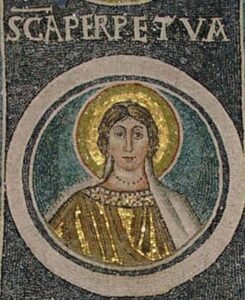
The Holy Martyr Perpetua of Carthage
commemorated on February 1 in the Orthodox Church
Introduction
In our contemporary world, almost everything that every noteworthy person does and says is recorded or caught on video – so that some celebrities spend much of their time hiding from the press or the paparazzi, so they can gain a little privacy. Famous people are interviewed on the news or talk shows, and not infrequently they write the story of their lives – sometimes for the sake of history, often just to make money. Most of this material winds up on the internet, where the great majority of us get our information these days, and where – increasingly and for reasons that seem diabolical – many falsehoods (OK, lies) are circulated.
We ordinary folk receive so much material that we can’t possibly take it all in, and we find it very hard to know what is important and what is not, what is true and what is false. May God help us all.
In the ancient world it was very different, of course. In many cases, the stories of lives of the saints were passed on orally for quite some time before they were finally written down. * An extreme example is our dear Saint Nicholas of Myra, about whom nothing was written for centuries – not that he is any the less known and loved because of that. He has been a very busy man since his death.
- …which method was fairly dependable in those days when people weren’t overwhelmed with information.
In the case of a very few ancient saints, we have accounts written by those who were there, such as the martyrdom of Saint Polycarp, or of Saint Stephen the Proto-martyr. Acts chapters 6 and 7
I think only in one instance do we have part of the story written by the saint herself: Portions of the account of the Martyrdom of Saint Perpetua of Carthage were taken directly from her diary! The rest of her story was recorded by one who was close to her and was an eye-witness to it all.
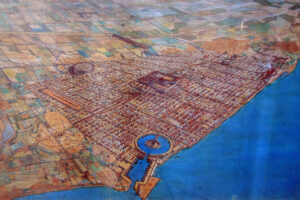
Carthage was an ancient great city of North Africa, nearly leveled in the Roman conquest of 146 BC, but then rebuilt. In the early Fourth Century AD it was part of the pagan Roman Empire. Its ruins are now just outside Tunis, the capital of Tunisia. Like the rest of the Empire, it soon would become Christian. But at the time of Perpetua, not yet.
This, I warn you, is a heart-wrenching story – of a young woman, a young mother who had almost everything to live for in this life, yet gave it all up for the sake of her Lord and Savior Jesus Christ. The moral challenge facing Perpetua must have been overwhelming. Her emotions must almost have torn her apart… but we’re getting ahead of ourselves. First you should hear her story.
There is a brief account of her martyrdom immediately below. However, if you’d like to read the full story, which is well worth it, here are two sites (among many) to access it:
Click to access The_Martyrdom_of_Saints_Perpetua_and_Felicitas.pdf
https://www.johnsanidopoulos.com/2017/02/the-passion-of-holy-martyrs-perpetua.html
________________________________
I have had an extremely and unexpectedly busy week. Therefore, rather than research her story myself, I’m taking the following – which is in italics – from the OCA * site: (I hope they don’t mind.) In the middle there will be one long interjection, which is in regular print.
- Orthodox Church in America, https://www.oca.org/saints/lives This is an excellent and easily accessible source of daily hagiographies.
The Holy Martyrs Perpetua, Felicitas and those with them.
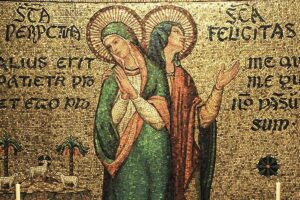
Vibia Perpetua was from a patrician family, and lived in Carthage. She came to believe in Christ, and was baptized after her arrest as a Christian. A few days later, the twenty-two-year-old woman was taken to prison with her infant son. Arrested with her were her brother Saturus, the servants Felicitas, Revocatus, Saturninus and Secundulus, who were also catechumens.
Despite the exhortations of her father, who persistently appealed to her maternal feelings, the widowed Saint Perpetua refused to offer sacrifice to the pagan gods.
Here, taken directly from Perpetua’s diary, is her account of his visit:
“My father also arrived from the city, worn with worry, and he came to see me with the idea of persuading me.
“‘Daughter,’ he said, ‘have pity on my grey head–have pity on me your father, if I deserve to be called your father, if I have favored you above all your brothers, if I have raised you to reach this prime of your life. Do not abandon me to be the reproach of men. Think of your brothers, think of your mother and your aunt, think of your child, who will not be able to live once you are gone. Give up your pride! You will destroy all of us! None of us will ever be able to speak freely again if anything happens to you.’
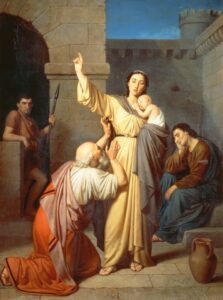
“This was the way my father spoke out of love for me, kissing my hands and throwing himself down before me. With tears in his eyes he no longer addressed me as his daughter but as a woman. I was sorry for my father’s sake, because he alone of all my kin would be unhappy to see me suffer.
“I tried to comfort him saying: ‘It will all happen in the prisoner’s dock as God wills; for you may be sure that we are not left to ourselves but are all in His power.’
“And he left me in great sorrow.”
________________________________
Try to put yourself in her place, if you can. Think what must have been going on in her mind:
“My father loves me so much. How can I leave him like this, when he just doesn’t understand why I’m doing this? And I’m a new mother! I love my baby. How can I abandon my little child who needs me so much?
“And yet… and yet… how can I abandon my Lord who loves me even more? He told me clearly what to do: ‘Whoever loves father or mother more than Me is not worthy of Me. And whoever loves son or daughter more than Me is not worthy of Me.’ Matthew 10:37 My Lord Jesus must come first.”
There have been a multitude of Christian martyrs, especially during the early centuries of the Church and again in the Twentieth Century under the Communists. Unlike Saint Perpetua, most of them died in obscurity, their names and stories forgotten on earth, remembered only in the Kingdom of Heaven. But most of them faced the same agonizing choices as did Perpetua. Many had friends or family whom they loved, some of whom could not understand. Yet they, like Saint Perpetua, chose for their Lord Jesus Christ.
Pray to God that you and I never have to face such an awful decision. Almost certainly we won’t – not here, not now. * However, in lesser ways, much lesser ways, all of us must make daily choices between Jesus Christ and the winsome attractions all around us, some of them good in and of themselves, which can turn us away from Him. For example, the choice between Sunday morning breakfast with your family instead of going to Divine Liturgy. You might make a list of them for yourself, and consider which you are choosing. Jesus Christ calls us to little “martyrdoms” every day, doesn’t He?
- Some Christians in the United States believe they are being persecuted. Little do they know. They should read the stories of the martyrs.
_____________________________________
Back to the account from the OCA:
Before their execution, Saints Perpetua and Saturus had visions from God, which strengthened their souls. Saint Felicitas, who was eight months pregnant, gave birth to a baby girl while in prison. She rejoiced because now she would be permitted to die with her companions. There was a law forbidding the execution of pregnant women.
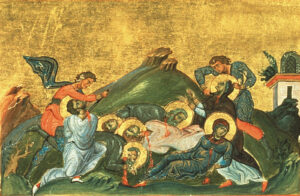
The martyrs were led from the prison into the amphitheatre. Saturninus and Revocatus had to face a leopard and a bear. Saints Perpetua and Felicitas were brought to the arena in nets, and they were pitted against a wild heifer. After being tossed to the ground by the heifer, the two women were led out of the arena. Saturus was bitten by a leopard, but did not die. The martyrs were then led to a certain spot to be killed by the sword. The young gladiator who was to execute Saint Perpetua was inexperienced and did not kill her with the first blow. She herself took his hand and guided it to her throat, and so she received the crown of martyrdom. This occurred in about the year 203.
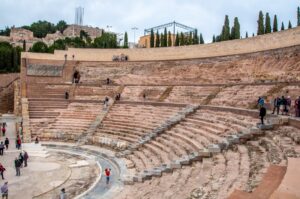
The amphitheatre where these saints perished is located a few miles from the city of Tunis. In 1881, a room was discovered opposite the modern entrance into the arena. Some say this was a cell where the victims waited to be brought into the arena.
_____________________________
It’s a story to make a person cry with tears of sorrow for Saint Perpetua and what she had to leave behind – and also for her poor father who loved her so much. I can easily put myself in his place. I have children and grandchildren. Surely he thought she was caught up in this strange radical sect only in her youthful enthusiasm. He was sure she’d soon grow out of it – so now she was throwing her life and his love away for nothing. And it’s a story to make all of us rejoice for the courage of this brave young woman and for the heavenly crown she attained.
Holy Perpetua, pray with your powerful prayers to Christ our God for the salvation of our souls.

Next Week: The Sundays of Pre-Lent
Week after next: Bishop Meletios of Antioch, the Saint who refused to be silenced